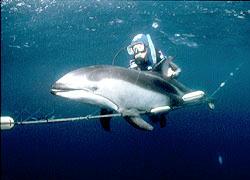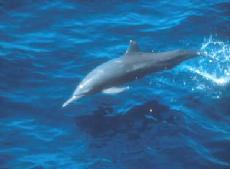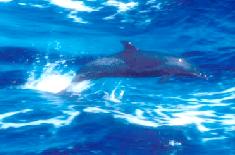|
"Despite considerable scientific effort by fishery scientists, there is little evidence of recovery, and concerns remain that the practice of chasing and encircling dolphins somehow is adversely affecting the ability of those depleted stocks to recover," the study said.
"The Bush administration's claim that chasing and netting of dolphins is 'safe' for dolphins is fraudulent and must be overturned by the courts," said David Phillips, director of the Earth Island Institute's International Marine Mammal Project, which released the unpublished NMFS report.
A diver from the environmental group
Greenpeace works to free a dolphin trapped
underwater in a fishing net.
(Photo courtesy Greenpeace)
Arguing that the decision by NMFS ignores two federal court rulings against a similar decision, made in 1999 by former Commerce Secretary William Daley, Phillips warned that, "We will be seeing the Bush administration in court, as this decision is clearly illegal."
U.S. participation in the Eastern Tropical Pacific tuna fishery has decreased over the years while foreign participation in the fishery has continued to increase. U.S. tuna fishermen no longer set nets on dolphins, and the major U.S. tuna processors - StarKist, Bumble Bee, and Chicken of the Sea - have pledged they will not buy tuna caught by chasing and netting dolphins.
In the mid-1990s, Mexico threatened action against the United States on the grounds that the U.S. dolphin-protection laws violate the free trade rules of the World Trade Organization.
Clinton administration officials backed the Mexican government and advocated not only for opening U.S. markets to Mexico's tuna but also for changing the definition of dolphin safe to allow tuna caught by methods that harm dolphins to be sold under the dolphin safe label.
The Commerce Department, which overseas NMFS, was required by Congress to conduct research and make a finding regarding the impact of the tuna purse seine fishery on depleted dolphin stocks in the Eastern Tropical Pacific, before changing the criteria for using the dolphin safe label.
The eastern spinner dolphin, one of the species
impacted by tuna fishing in the Eastern Pacific,
is estimated to be at about 35 percent of its
historic numbers, and is designated as depleted
under the Marine Mammal Protection Act.
(Two photos courtesy NMFS)
The agency's decision, just meeting the December 31 deadline, was based on a review of the results of this required research, information obtained under the existing International Dolphin Conservation Program (IDCP) and other relevant information.
Mexican officials said the new definition of dolphin safe helps insure that the U.S., Mexico, and South American countries will continue to work together to protect dolphins.
"The Mexican Government welcomes this decision that will assure the continuation of the Agreement of the International Program for Dolphin Conservation, one of the most important fishery conservation agreements," said a spokesperson from the Mexican embassy in Washington DC.
NMFS Director Hogarth said that the U.S. plans to seek better enforcement of IDCP requirements and promote a package of improvements to the program, including new requirements on the growing number of smaller tuna fishing vessels plying the region's waters.
NMFS said it will continue to conduct about $3 million per year worth of research and monitoring on depleted dolphin stocks. Working with the IATTC and the U.S. Marine Mammal Commission, the agency will conduct annual reviews of the effectiveness of the IDCP and continue to develop conservation measures to recover depleted dolphins and maintain tuna stocks.
The northeastern offshore spotted dolphin
is at just 20 percent of its historic levels.
In the meantime, several conservation groups plan to ask the courts to overturn the NMFS decision.
"The Bush administration is selling out dolphins in order to reward Mexican tuna millionaires," said Phillips. "If the Secretary's decision is left intact, 20,000 to 40,000 dolphins each year will be sacrificed, and falsely labeled Mexican tuna will be on the U.S. market as 'dolphin safe.' We cannot allow that to occur."
More information regarding the dolphin safe tuna program is available at:
http://www.nmfs.noaa.gov/prot_res/PR2/Tuna_Dolphin/tunadolphin.html
|


